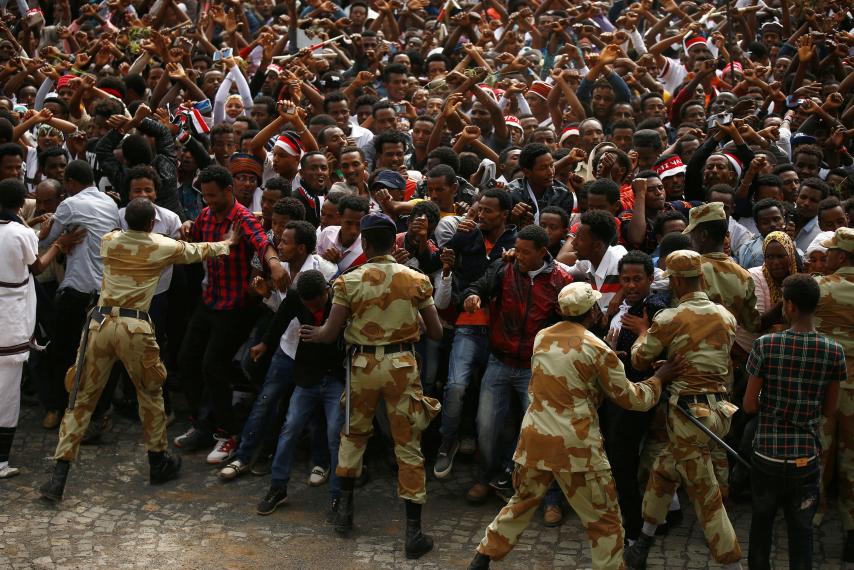Ethiopia on a Trajectory of Political Apocalypse?
by Chalachew Tadesse / March 9, 2018 / Comments Off on Ethiopia on a Trajectory of Political Apocalypse?
Gripped by non-ending unrest and political crisis, Ethiopia is passing from crisis, through crisis, to more crises under the leadership of the bizarre Ethiopian Peoples’ Revolutionary Democratic Front (EPRDF), the ruling party which is a coalition of four ethnic-based parties. Mass protests and ethnic conflicts, mostly believed to be by government design, have been recurrent over the last tumultuous two years, especially in the two largest regions: Oromia and Amhara. In September of last year alone, orchestrated ethnic clashes between ethnic Oromos and Somalis caused several deaths and evicted close to a million ethnic Oromos.
Protesters oppose repression, human rights violations, denial of political rights, forced dispossession of their land, arbitrary detention and killings, and economic and political marginalization. Yet the government has refused to heed to these demands, instead continually resorting to the use of excessive lethal force. As a result, security forces have killed several hundreds of peaceful civilian protesters in the last three years. However, no independent investigation into the killings has been made. Repeated requests by the UN human rights monitors to get access to the country haven’t been complied with.
A political crisis, the biggest of its kind since the overthrow of the communist regime in 1991, is deepening in the country. Divisions along ethnic lines are also emerging within the ruling coalition, as member parties, particularly the Oromo People’s Democratic Organization (OPDO), break on a few occasions from the official rhetoric by aligning itself with the protesters.


In the wake of uninterrupted protests, the regime known for duplicity has since January given mixed signals that vindicate the title of my column for Sampsonia Way magazine: “Double-faced Ethiopia.”
In December 2017 Ethiopia’s Prime Minister Hailemariam Desalegn made two unexpected announcements: the closure of the notorious Maekelawi detention facility, and the release of prisoners by pardon. According to the official narrative, both steps are intended to facilitate national consensus and increase the democratic space. Indeed, both decisions are historic and historical.
Ma’ekelawi closure
Needless to say, the half-a-century old Ma’ekelawi, a criminal investigation center where the investigative police extract confessions from detainees under duress, has long represented Ethiopia’s ugly face. Under Maekelawi’s roof, torture was perpetrated by the former military junta (known in short as Dergue) during the infamous Red Terror (in Amharic Qey Shibr) mass murder campaigns of the 1970s and 80s.
Quite strangely, however, the incumbent Prime Minister in his statement said torture in Ma’ekelawi is thing of the past. What a mockery of truth! In a report titled They Need a Confession, Human Rights Watch has documented countless stories of torture and other forms of callous inhuman treatment in Ma’ekelawi under this regime. Fittingly, Amnesty International also calls it Ethiopia’s “torture chamber” for the last twenty years.
To the pleasure of the deceptive regime, several international media and rights groups lauded the reform. Amnesty International in particular welcomed the shutdown of Ma’ekelawi as a step that could signal “the end of an era of bloody repression,” which unfortunately is a gross overstatement. For the regime, the statement is a much-needed and timely prize precisely because this is what the authorities always want the international community to hear.
For optimistic Ethiopians Maekelawi’s closure won’t be more than a symbolic gesture that is too little, too late. In contrast, skeptics like me read that the government has a sinister motive, i.e. a deceitful concession mainly intended to whitewash the regime’s past callous crimes of torture.
That said, no one knows if Ma’ekelawi’s shutdown will come to fruition. As we adapt ourselves to the regime’s countless false promises from time to time, we may not even see this promise actually be adhered to. Alas, our rulers also know that our collective memory is short, as they are fully aware that more pressing issues are yet to come.
Mass release of prisoners
In the past two months more than 6,000 political prisoners and prisoners of conscience have been released through granting of pardon and dropping of pending charges. Among them are Eskindr Nega, a blogger and journalist who has won multiple international awards, and Oromo opposition politicians Merera Gudina (Ph.D.) and Bekele Gerba.
In his first announcement, Prime Minister Hailemariam used the term “political prisoners.” Authorities were nevertheless quick to pour cold water on the optimism when they made a U-turn, blaming the media for mistranslation. Within an hour or so, the statement that was posted online was edited and re-edited over and again, thereby replacing the word “political prisoners” with “politician prisoners.” Even though nothing was lost in translation, the authorities realized that the initial statement amounted to an explicit admission of holding political prisoners, which they always deny. What is more, the blanket unconditional pardon was changed to a conditional one.
Why the contradictory and mixed signals? Was the first catchy word “political prisoners” intended for foreign consumption? Or was the U-turn a sign of internal divisions within the ruling party over the matter? Both could be plausible reasons.
Resignation and succession dilemma
A day after the release of prominent political prisoners another political drama ensued. In a surprise move, Prime Minister Hailemariam tendered his resignation. Even more surprising and absurd are the reasons he gave for his resignation: “To facilitate the path to democratic reforms and stem a wave of anti-government protests.” In reality, he is no obstruction to any democratic reforms at all, but quite the opposite!
Thanks to the secrecy that shrouds the ruling EPRDF, it is hardly possible to establish exactly why and how he quit. All indications, however, point to one plausible reason: that he might be forced to resign by hardliners opposed to reforms. Sarcastically, EPRDF diehards still trumpet that the PM’s departure is the first ever peaceful transfer of power in Ethiopia’s political history. Hurrah for EPRDF! Be that as it may, few hope the departure of Hailemariam, who after five tumultuous years in power leaves the country at a critical juncture, will bring about any positive change.
Needless to say, the PM’s resignation didn’t send shockwaves among Ethiopians. Since he came to power following the demise of the late benevolent dictator prime minister Meles Zenawi (also longtime leader of the Tigray People’s Liberation Front/TPLF, a core party of the EPRDF coalition representing ethnic Tigreans), Hailemariam, who was chosen from a tiny ethnic community supposedly to balance the biggest ethnic parties, has mostly been a TPLF puppet. Behind the curtain, it is a collective leadership of a handful of old guards of the TPLF that wields real power. Oddly, however, ethnic Tigreans make up only 6% of the total 100 million population. This is why the largest Oromo and Amhara ethnic groups are protesting against political and economic marginalization by the TPLF-dominated regime.
Hailemariam’s departure has given rise to a power succession scramble within the EPRDF that is slowly taking an ethnic dimension. In particular, the majority ethnic Oromos under the OPDO are aggressively claiming that they deserve the position this time around, an unusual move that certainly sparks tension within the coalition. Nearly a month has passed since the PM’s resignation announcement, yet the divided EPRDF has yet to name a successor. The deepening political crisis is also complicating the relationship between ethnicity and political power. With nearly 80 ethnic groups ethnicity is always a delicate and combustible matter and hence, the succession battle could stir violent ethnic sentiments beyond the party.
But whoever replaces Hailemariam won’t bring any meaningful political change to the country whatsoever. Alas! No single person or political party is capable of addressing the myriad of problems the country is facing today.
Adios State of Emergency
A day after the Prime Minister resigned, another political drama also emerged: a six-month national state of emergency (SoE) was declared, the second in less than two years, to “restore law and order.” What a mockery of the very constitution the SoE claims to safeguard! Clearly, the SoE amounts to a silent coup d’état! Needless to say, no single armed insurgency endangering peace exists in the country! By no means did the situation warrant a second SoE at all. On the contrary, the authorities were proudly claiming until a day earlier that security forces managed to restore normalcy to the country.
Freedom of expression, assembly and the press has been curtailed by the SoE, which is being overseen by a civilian-cum-military body called Command Post. Security forces are given extraordinary sweeping powers including taking “all the necessary measures to restore peace.” In today’s Ethiopia, this literally means a free license to kill. A curfew will also be declared when the Command Post deems it necessary.
In what appears to be a clear split within the ruling coalition, 88 Oromo lawmakers of the ruling coalition opposed the SoE when it was presented to the parliament after 15 days. Even though the decree was passed by the parliament, in which 100 percent of the seats are controlled by the ruling party, the unprecedented opposition should be contrasted with the October 2016 SoE that was passed unanimously. Not even a single opposition vote on critical matters has been recorded in the parliament in more than twenty years.
Even so, disputes have emerged challenging the official position that the SoE was ratified in a closed session. A leaked video footage showing that the initial votes in favor of the SoE announced by the speaker fell short of the two-thirds majority threshold has sparked serious doubts among democracy activists and media outlets that the parliament may have rigged its own vote tallying. On the other hand, the government attributes the discrepancy to computing errors by the parliament’s speaker. In any case, the dispute has since raised questions about the legality of the SoE.
To the dismay of the regime, the SoE has been largely defied in many areas of Oromia and Amhara regions. Sit-in strikes, closure of services and blockade of roads is widespread in several towns of the largest Oromia region, resulting in the killing of civilians by security forces. Quelling these kinds of protests once and for all is therefore the sole goal of the SoE. Nevertheless, the ongoing defiance is indication that the SoE is likely to backfire sooner rather than later. Amidst this tense situation the US Secretary of State Rex Tillerson is in Ethiopia presumably to put pressure on the authorities to hold inclusive political dialogue.
If I have to call it like I see it, Ethiopia is now a de facto police state, run by a military-cum-civilian body. Brute force is increasingly becoming the sole modus operandi to deal with popular demands, so to speak. Pressure is mounting (albeit in vain) to lift the marital law and start an all-inclusive political dialogue. Even the United States, the regime’s staunchest ally, immediately decried the SoE in the most strongly-worded statement yet only to fall on deaf ears. No matter the backlash the government seems determined to push the country to the edge in order to maintain its grip to power.
Over the past two years, the government has arrested tens of thousands of people and several hundred have been killed. Opposition parties, civil society and media are all effectively decimated by the regime. Since ethnicization of politics has complicated the path toward democracy, democratic reforms alone won’t solve the problem. Surely the unique model of ethnic federalism- the only anomalous model in the world today- needs an overhaul.
Ethiopia is in an uncharted waters today more than ever before. Due to the regime’s intransigence the chances for peaceful change are becoming slim, thereby making violent change inevitable. What haunts Ethiopians now is a nightmarish trajectory of an all-out ethnic civil war and possibly state collapse. God forbid it, a political apocalypse is simmering underneath. As the second most populous nation in Africa, Ethiopia’s crisis will have far-reaching ramifications on the Horn of Africa region as a whole.>





